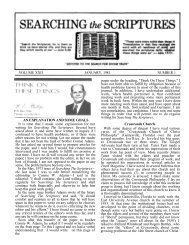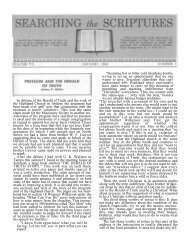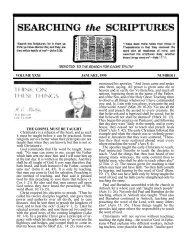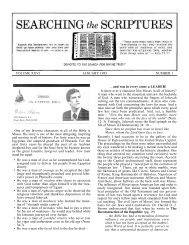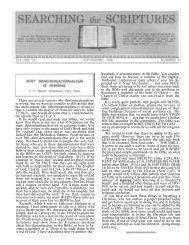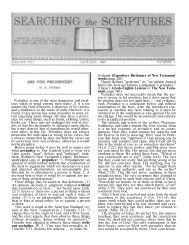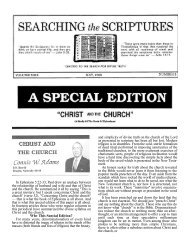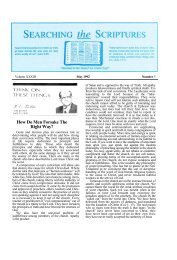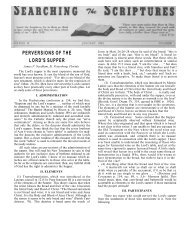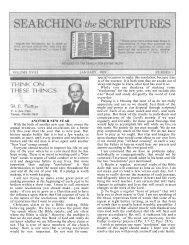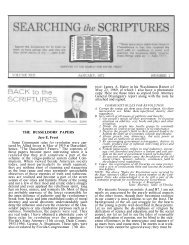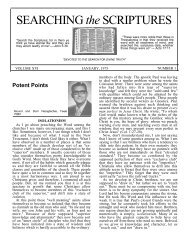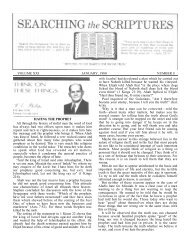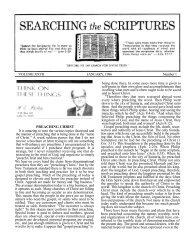Volume 29 – 1988 (PDF) - Searching The Scriptures
Volume 29 – 1988 (PDF) - Searching The Scriptures
Volume 29 – 1988 (PDF) - Searching The Scriptures
Create successful ePaper yourself
Turn your PDF publications into a flip-book with our unique Google optimized e-Paper software.
Page 12 ___________________________________________________________________________________________________<br />
compromise his belief or his influence through participation<br />
in this pagan system. If there remains any doubt, a<br />
consideration of the exclusive claims made for the Bible,<br />
Christ and His way in 2 Timothy 3:16,17; Acts 4:12; and<br />
John 14:6 should eliminate those doubts.<br />
Its Elevation of Human<br />
Philosophy above Scripture<br />
One who reads much from Morals and Dogma sees<br />
soon that Masonry there exists a higher veneration for<br />
human philosophy than for Scripture. <strong>The</strong> writings of<br />
ancient philosophers, the star-gazings of astrologers,<br />
and the symbolisms of mystery cults of antiquity are<br />
quoted and relied upon more than the Book of God. <strong>The</strong><br />
traditions and commandments of men have a place<br />
equal to Divine Writ.<br />
It is in this phase of this study that Colossians 2:8-10<br />
and 20-23 apply. Such dependence upon the philosophical<br />
meanderings of men and speculative theology of ancient<br />
symbols surely shows doubt of sufficiency in<br />
Christ.<br />
Its Method of<br />
Deception and Secrecy<br />
In the first three degrees of Masonry, also designated<br />
the Blue Lodge, there is intentional deception employed,<br />
so that the initiate, thinking that he understands the<br />
matters, will really misunderstand them. In his later<br />
status of a prince (Adept), he will be given their true<br />
explanation (Pike, Morals and Dogma, pg. 819). Is it<br />
any wonder that early adherents of Masonry disavow<br />
any religious aspects being a part of Masonry? <strong>The</strong>y do<br />
so because they have been lied to so they will imagine<br />
there are none.<br />
One of the landmarks of Masonry is its secrecy (Masonry<br />
Defined, pg. 137). Of course, the real secret of the<br />
whole matter is that the "secrets" are not so secret now.<br />
It seems that some Masons have learned this secret.<br />
Masonic sources are available. One wonders why a<br />
system claimed so beneficial and valuable is so enshrouded<br />
in "secrecy." <strong>The</strong> valuable lessons of Christ<br />
were disclosed for the benefit of all. (Jn. 18:20).<br />
Its Oaths Vain<br />
and Meaningless<br />
<strong>The</strong> strange oaths of Masons can be read in detail in<br />
their various sources, including Masonry Defined and<br />
Duncan's Masonic Ritual and Monitor. All of the degrees<br />
of Masonry have their separate oaths, each of<br />
which involves the death penalty for breaking it. <strong>The</strong><br />
penalties, however, are not what they seem to be, according<br />
to Masonry Defined. <strong>The</strong>y amount to suspension<br />
and expulsion only. (pg. 242).<br />
Who could take such an oath in view of Matthew 5:34-<br />
37 and James 5:12? False swearing is clearly forbidden<br />
here, if not all swearing of the frivolous sort.<br />
Its Fellowship with False<br />
Doctrine and Heathen Ceremony<br />
<strong>The</strong> fellowship made possible is not limited to a civic<br />
sharing or a benevolent association; it involves participation<br />
in religious activities custom-made to keep all<br />
happy in their profession of faith in many gods and lords.<br />
Not only the Mason participates in these practices, but<br />
he also helps to support and propagate such spiritual<br />
mush through his efforts and his financial support. How<br />
in the world can a Christian support the preaching of the<br />
gospel of Christ by his contribution on the Lord's Day<br />
and then help to finance such compromise out of the<br />
other pocket?<br />
A close study of 1 Corinthians 8:5, 6, in regard to the<br />
pagan practice under discussion in the context, will<br />
reveal that the Christian should not take part in false<br />
religious practices even when he thinks them to be<br />
lacking in religious significance, for the sake of influence<br />
on others. How much stronger is the application to those<br />
practices which are so obviously and admittedly (by the<br />
experts) religious! Ephesians 5:11 also speaks to this<br />
matter in its prohibition of the Christian's participation<br />
in "works of darkness."<br />
<strong>The</strong> precepts and principles of God are clear. <strong>The</strong><br />
understanding that one can gain therefrom will cause<br />
one to hate "every false way." He will detest such false<br />
ways so much that he will sever his connections with<br />
Masonry. Having done so, he will then find in Christ a<br />
sufficiency and a completeness unequalled elsewhere.<br />
PRAYERS TO THE DEAD!<br />
AND PRAYERS FOR THE DEAD!<br />
St. Joseph's Catholic Church in Macon, Georgia,<br />
publishes a bulletin on Sundays, and their publication<br />
for August 16,1987, contained a front page article by a<br />
priest named Tom Murphy, making reference to the<br />
subject of prayers for the dead.<br />
Although Murphy does not give book, chapter and<br />
verse, he refers to the occasion when a woman from<br />
Canaan approached Christ, concerning the condition of<br />
her daughter who was demon-possessed. In this instance,<br />
nobody was dead! Prayers and petitions involved<br />
the living! (Read Matt. 15:21-28).<br />
In fact, priest Murphy cannot show us a single passage<br />
in the New Testament where anyone prayed TO<br />
the dead, or prayed FOR the dead!<br />
<strong>The</strong> living prayed for the living, whether the one<br />
prayed for was sick or in sin. In fact, the Psalmist wrote:<br />
"<strong>The</strong> dead do not praise the Lord, nor any who go down<br />
into silence" (Psalms 115:17). <strong>The</strong> Preacher, wrote: "For<br />
the living know that they will die; but the dead know<br />
nothing..." (See Ecclesiastes 9:5).<br />
When Christians pray to God the Father, through<br />
Christ the Son, we are living beings who are petitioning<br />
a living Saviour. We believe that Christ is "alive and<br />
well" as is expressed in modern terminology... therefore<br />
we pray to Him!<br />
Will priest Murphy please give us a New Testament<br />
passage that teaches the idea or validity of praying/TO<br />
or FOR those who have died?<br />
Since the Catholic Church was established after the<br />
time of Christ on earth, priest Murphy should be able to<br />
provide his followers with a New Testament passage<br />
that establishes such a practice, if it is indeed approved<br />
by Inspiration.<br />
Luther W. Martin



